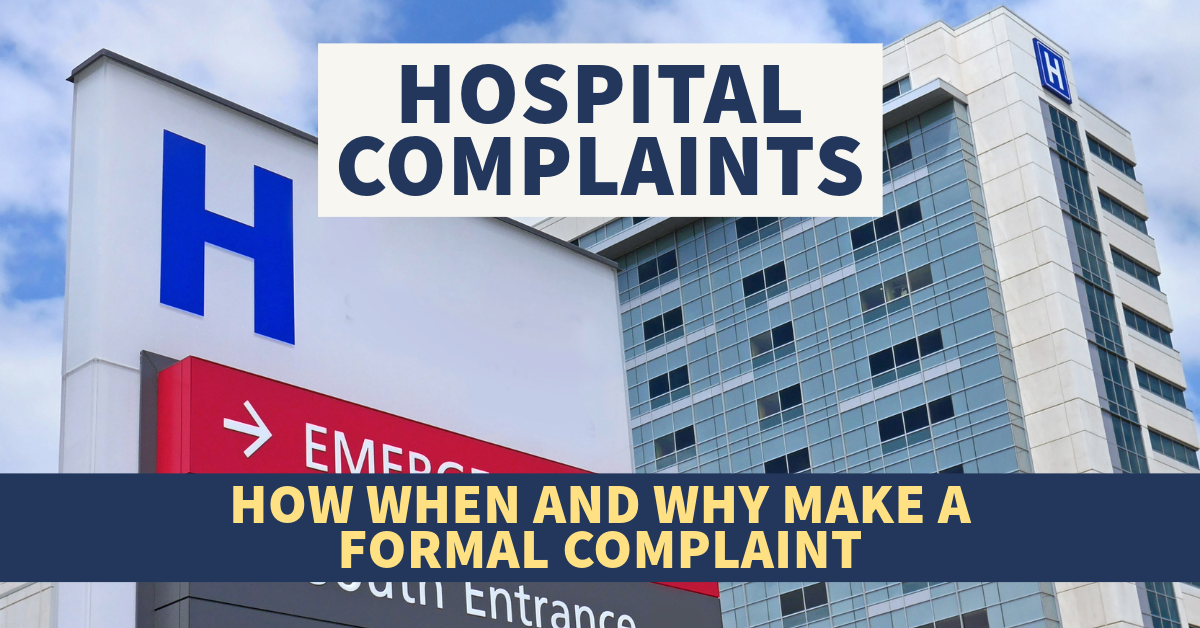Hospitals are extremely busy places with hundreds, if not thousands, of healthcare workers all doing their best to provide safe and effective care to many sick patients. Despite best intentions, patients sometimes fall through the cracks and receive negligent medical care in the hospital setting. The result could be a deadly medication error, a missed laboratory result, or a failure to communicate an important clinical finding that causes major disability or even death to you or a loved one.
If you are concerned about the care you or a loved one received while in hospital, you should consider making a formal complaint. The how, when and why of making hospital complaints in Ontario are explained in this post.
HOW TO MAKE A HOSPITAL COMPLAINT
Patients are entitled to complain about their treatment at a hospital or from a healthcare professional if they believe they have received negligent medical care. To make a complaint, you must first consider which organization to make your complaint to.
Patient Ombudsman accepts complaints about patient experiences in Ontario’s public hospitals, long-term care homes, and home and community care support services. Patient Ombudsman can also direct you to the appropriate person or place to resolve your concern if your complaint is about treatment you received from a doctor or at a medical clinic that operates independently of a hospital (e.g., walk-in clinic, pain clinic or vaccination clinic).
However, Patient Ombudsman cannot assist with premature complaints. Therefore, before making a complaint to Patient Ombudsman, you should first reach out to the organization in question and give them a chance to respond to your concerns. For example, if your complaint is about a hospital, you should first contact the patient relations department. Each hospital has its own patient relations complaint process. Go to the website of the hospital that you are concerned about for more information. As an example, here is a link to the patient relations page for Mount Sinai Hospital in Toronto.
Patient Ombudsman also cannot assist with complaints about regulated healthcare professionals. Regulated professionals such as doctors, nurses or physiotherapists, are governed by regulatory bodies or “colleges” that handle complaints against these regulated healthcare professionals. Each regulated profession is governed by its own college. For example, complaints against doctors in Ontario are regulated by the College of Physicians and Surgeons of Ontario (“CPSO”), and complaints against nurses in Ontario are regulated by the College of Nurses of Ontario (“CNO”).
It is important to know and understand that in the hospital setting, physicians are legally independent operators. They are not employees of the hospital. You should keep this in mind when considering making a complaint to a hospital.
If you are unsure of where to make your complaint, Patient Ombudsman can connect you with the most appropriate organization, complaint body or service.
How to make a complaint to Patient Ombudsman
To make a complaint to Patient Ombudsman, you must fill a complaint form, generally requiring your name and other relevant personal information. This information will be used to contact you to resolve your complaint and may also be used in an investigation by Patient Ombudsman.
Your consent is required to proceed with resolving your complaint. All complaint information is strictly confidential. If you are a caregiver or making a complaint on someone’s behalf, the patient or patient’s substitute decision-maker is required to fill out a separate consent form for Patient Ombudsman and the health sector organization to share the patient’s personal information in attempting to resolve your complaint. Patient Ombudsman also requires you to assert that the patient or substitute decision-maker consents to have their personal health information in the complaint form.
Once you have sent your complaint in writing, an Early Resolution Specialist will contact you to verify your information and determine if your complaint falls within the Patient Ombudsman’s mandate. If it does, the Early Resolution Specialist will:
- Confirm they have the appropriate consent to collect personal (health) information to continue with your complaint file;
- Get your ideas on what you want to achieve through your complaint;
- Offer and ask for your input on other resolution suggestions;
- Inform the health sector organization about your complaint and reasonable resolution suggestions;
- Engage in ongoing conversations between you and the health sector organization in an attempt to resolve your complaint;
- Notify you and the health sector organization whether the resolution was successful; and
- If no resolution occurs, notify you of next steps including whether an investigation will take place.
About the Excellent Care for All Act
Recent legislation is also requiring hospitals to disclose critical incident data to improve quality of care. The Excellent Care for All Act, 2010 mandates hospitals to develop annual quality improvement plans regarding its aggregated critical incident data. After a critical incident is disclosed, hospital boards are now required to ensure that the hospital administrator establishes a system for analyzing the critical incident and developing a system-wide plan to avoid or reduce the risk of similar incidents.
The Public Health Act Regulation 965 ensures that the administrator provides aggregated critical incident data to the quality committee at least two times per year.
Further, the Ministry of Health and Long-Term Care requires all Ontario hospitals to report all critical incidents related to medication/IV fluids through the National System of Incident Reporting within 30 days following the disclosure of the critical incident to the Medical Advisory Committee, administrator and/or patient.
WHEN TO MAKE A HOSPITAL COMPLAINT
If you are sufficiently concerned about the quality of care that you received in a hospital or long-term care home, then you may also have a potential lawsuit for medical malpractice if serious harm or death was the consequence of the poor medical care. It is always best to raise your concerns early so that they can be addressed.
Some people are intimated about the prospect of making a complaint to a hospital even though they may be extremely concerned about the medical care they received. It would be perfectly reasonable to speak to an experienced medical malpractice lawyer before lodging a complaint who could provide you with advice and recommendations with respect to the process.
It is my usual practice as a Toronto medical malpractice lawyer to recommend making hospital complaints promptly however depending on the specific facts of the case, my advice may be different. It is important to speak with a lawyer early on if you are unsure about how best to proceed.
WHY MAKE A HOSPITAL COMPLAINT
Hospital complaints should be made for the following reasons:
- Hospital complaints allow you to bring to the attention of the hospital a concern you have about the quality of medical care. If you don’t make the complaint, the concern you have most certainly will never be brought to light. As a result, it may happen again to another patient with devastating consequences. Hospitals are busy places and although they are proactive in terms of quality control, they can’t know everything. Making a hospital complaint can improve quality of care for other patients.
- A hospital complaint may also help you better understand what, if anything, went wrong in your care or the care of your loved one. A patient relations meeting with the healthcare professionals involved may (or may not) reassure you that proper care was provided in your case.
If you are unsure whether or not to make a hospital complaint, it would be best to speak with an experienced medical malpractice lawyer for advice.



